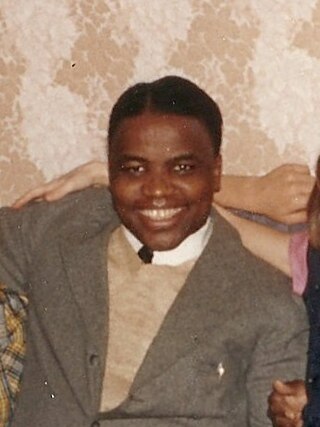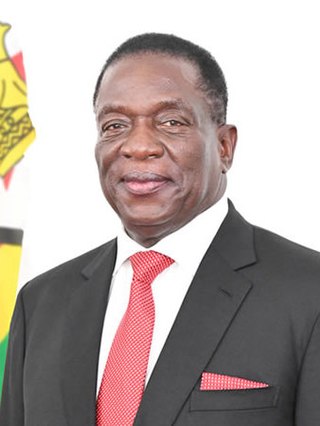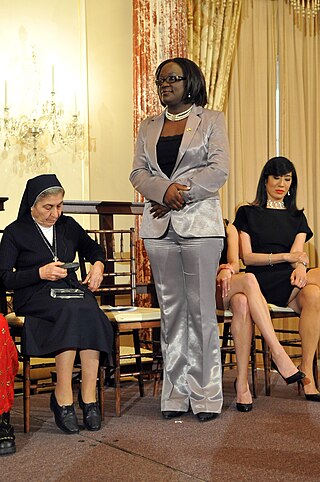Related Research Articles

Ndabaningi Sithole was the founder of the Zimbabwe African National Union (ZANU), a militant, nationalist organisation that opposed the government of Rhodesia, in July 1963. Sithole's father was Ndau and his mother was Ndebele. He worked as a United Church of Christ in Zimbabwe (UCCZ) minister. He spent 10 years in prison after the government banned ZANU. A rift along tribal lines split ZANU in 1975, and he lost the 1980 elections to Robert Mugabe.

The Interpreter is a 2005 political thriller film directed by Sydney Pollack, starring Nicole Kidman, Sean Penn, Catherine Keener, and Jesper Christensen. It was the first film shot inside the United Nations Headquarters, as well as the final feature film directed by Pollack before his death in 2008.
The Central Intelligence Organisation (CIO) is the national intelligence agency of Zimbabwe. It was conceived as the external intelligence-gathering arm of the British South Africa Police Special Branch in the early 1960s, under the Southern Rhodesian Prime Minister, Winston Field and is one of the secret police organization for President Robert Mugabe's regime.
The following lists events that happened during 2000 in Zimbabwe.

Emmerson Dambudzo Mnangagwa is a Zimbabwean politician who is serving as President of Zimbabwe since 24 November 2017. A member of ZANU–PF and a longtime ally of former President Robert Mugabe, he held a series of cabinet portfolios and was Mugabe's Vice-President until November 2017, when he was dismissed before coming to power in a coup d'état. He secured his first full term as president in the disputed 2018 general election. Mnangagwa was re-elected in the August 2023 general election with 52.6% of the vote.

There were widespread reports of systematic and escalating violations of human rights in Zimbabwe under the regime of Robert Mugabe and his party, ZANU-PF, between 1980 and 2017.

Tendai Laxton Biti is a Zimbabwean politician who served as Finance Minister of Zimbabwe from 2009 to 2013. He is the second Vice President of Citizens Coalition for Change. He was the Secretary-General of the Movement for Democratic Change and the subsequent Movement for Democratic Change – Tsvangirai (MDC-T) political parties and a Member of Parliament for Harare East until he was expelled from the party and recalled from parliament in mid-2014,before winning the seat again in 2018.
Andrew Meldrum is an American journalist who has concentrated on Africa and human rights. He worked in Zimbabwe for 23 years. Currently Meldrum is Africa News Editor for The Associated Press, working in Johannesburg, South Africa. He was a correspondent for The Economist and The Guardian in Zimbabwe from 1980 to May 18, 2003 before being expelled by the Zimbabwean government because the government objected to his reports exposing state torture.
Geoffrey Nyarota is a Zimbabwean journalist and human rights activist. Born in colonial Southern Rhodesia, he trained as a teacher before beginning his career with a Zimbabwean state-owned newspaper, The Herald. As editor of the state-owned Bulawayo Chronicle in 1989, he helped to break the "Willowgate" scandal, which resulted in several resignations from the cabinet of President Robert Mugabe.
The Zimbabwean government claimed to have foiled an alleged coup d'état attempt involving almost 400 soldiers and high-ranking members of the military that would have occurred on June 2 or June 15, 2007. The alleged leaders of the coup, all of whom were arrested, were retired army Captain Albert Matapo, Colonel Ben Ncube, Major General Engelbert Rugeje, and Air Vice Marshal Elson Moyo.
Patrick Antony Chinamasa is a Zimbabwean politician who served in the government of Zimbabwe as the minister of various cabinet ministries. Previously he served as the Minister of Finance and Investment Promotion and the Minister of Justice, Legal and Parliamentary Affairs.
Zimbabwe began experiencing a period of considerable political and economic upheaval in 1999. Opposition to President Mugabe and the ZANU-PF government grew considerably after the mid-1990s in part due to worsening economic and human rights conditions. The Movement for Democratic Change (MDC) was established in September 1999 as an opposition party founded by trade unionist Morgan Tsvangirai.
This article gives details about the vote counting system for the 2008 Zimbabwe presidential election
The second round of voting in the Zimbabwean presidential election of 2008 was held between Robert Mugabe and Morgan Tsvangirai after the first round failed to produce a 50% majority for either candidate. The election process was marred by violence against and intimidation of voters and party workers, which eventually led to the withdrawal of Tsvangirai from the poll. This left Mugabe as the winner of, effectively, a one-candidate election.
Supa Collins Mandiwanzira is a Zimbabwean politician and journalist who served as the Minister of Information Communication Technology (2014-2017) and then Minister of Information Communication Technology and Cyber Security in the Cabinet of Zimbabwe from November 2017 to September 2018. His earlier portfolio had been merged with cybersecurity. He is a member of the Zanu-PF political party. He was the founder of the ZiFM Stereo radio station, and the online ZiTV station.

Jestina Mukoko is a Zimbabwean human rights activist and the director of the Zimbabwe Peace Project. She is a journalist by training and a former newsreader with the Zimbabwe Broadcasting Corporation.

Morgan Richard Tsvangirai was a Zimbabwean politician who was Prime Minister of Zimbabwe from 2009 to 2013. He was president of the Movement for Democratic Change, and later the Movement for Democratic Change – Tsvangirai (MDC–T), and a key figure in the opposition to former president Robert Mugabe.
Hopewell Rugoho-Chin'ono is a Zimbabwean journalist. He has won numerous awards in journalism and has worked in both print and broadcasting journalism. He was a fellow at Harvard.

Beatrice Mtetwa is a Swazi was born 1957 and naturalised Zimbabwean lawyer who has been internationally recognized for her defense of journalists and press freedom. The New York Times described her in 2008 as "Zimbabwe's top human rights lawyer".

General elections were held in Zimbabwe on 29 March 2008 to elect the President and Parliament. Because of Zimbabwe's dire economic situation, the elections were expected to provide incumbent President Robert Mugabe with his toughest electoral challenge to date. Mugabe's opponents were critical of the handling of the electoral process, and the government was accused of planning to rig the election. Human Rights Watch said that the election was likely to be "deeply flawed."
References
- ↑ "The Pulitzer Prize Winners / International Reporting". The Pulitzer Board. 2002. Archived from the original on 2008-02-24. Retrieved 2008-04-03.
- ↑ "Zimbabwe judges decline to hear request on reporters". REUTERS. 2008-04-07. Archived from the original on 2008-04-11. Retrieved 2008-04-07.
- 1 2 Polgreen, Lydia (2008-04-07). "Times Reporter Held in Zimbabwe Jail Out on Bail". The New York Times. Retrieved 2008-04-07.
- 1 2 Bowley, Graham (2008-04-17). "Times Reporter Is Cleared by Zimbabwe". The New York Times. Retrieved 2008-04-17.
- ↑ "Past Fellows: 1981," Knight-Wallace Fellows at Michigan website. Accessed Oct. 26, 2015. Archived February 15, 2014, at the Wayback Machine
- ↑ https://news.illinois.edu/view/6367/207866
- ↑ Bearak, Barry (2008-04-03). "Mugabe Foes Win Majority in Zimbabwe". The New York Times . Retrieved 2008-04-03.
- ↑ "Police Surround Hotel in Zimbabwe". The New York Times . 2008-04-03. Archived from the original on April 3, 2008. Retrieved 2008-04-03.
- ↑ Shea, Danny (2008-04-03). "Barry Bearak, Pulitzer-Winning NYT Correspondent, Taken Into Custody In Zimbabwe". Huffington Post. Retrieved 2008-04-03.
- ↑ Wines, Michael (2008-04-04). "New Signs of Mugabe Crackdown in Zimbabwe". The New York Times. Retrieved 2008-04-04.
- ↑ "Times Says that Barry Bearak Has Been 'Falsely' Charged". The New York Observer. 2008-04-04. Archived from the original on 2008-04-08. Retrieved 2008-04-04.
- 1 2 3 Wakin, Daniel J. (2008-04-05). "Times Journalist Still in Zimbabwe Jail". The New York Times. Retrieved 2008-04-05.
- ↑ Dugger, Celia W. (2008-04-04). "Mugabe Will Fight On, His Party Says". The New York Times. Retrieved 2008-04-04.
- ↑ "IPI Calls on Zimbabwean Authorities to Immediately Release New York Times Correspondent Barry Bearak" (Press release). International Press Institute. 2008-04-04. Retrieved 2008-04-04.

